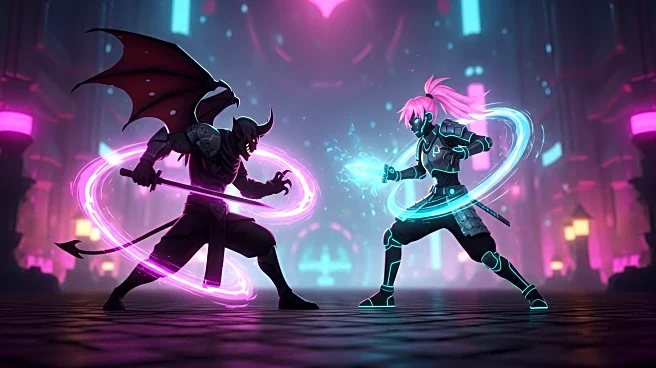What is the story about?
What's Happening?
Maggie Kang, the creator of the record-breaking Netflix animated movie 'KPop Demon Hunters,' has expressed her opposition to a live-action adaptation of the film. Kang believes that the unique tone and comedic elements of the movie are best suited for animation, making it difficult to envision the characters in a live-action format. Since its premiere in June, 'KPop Demon Hunters' has become Netflix's most-watched movie, with its soundtrack achieving historic success on the Billboard charts. The film centers on a K-pop girl group, Huntr/x, who are secret demon warriors battling a rival boy band. Kang, along with co-director Chris Appelhans, emphasizes the creative freedom animation provides, allowing for exaggerated and dynamic character portrayals that might not translate well to live-action.
Why It's Important?
The decision to keep 'KPop Demon Hunters' in animated form highlights the growing recognition of animation as a powerful medium for storytelling, capable of conveying complex narratives and emotions that might be constrained in live-action. This stance could influence future adaptations of animated works, encouraging creators to preserve the integrity and artistic vision of their projects. The film's success also underscores the global appeal of K-pop and its integration into diverse entertainment formats, potentially paving the way for more cross-cultural collaborations and innovative storytelling in the industry.
What's Next?
Netflix and Sony are reportedly in talks to produce a sequel to 'KPop Demon Hunters,' with Kang expressing interest in expanding the franchise through animation. Future installments may delve deeper into the backstories of the group members, offering fans more insight into the characters' histories and dynamics. This continued focus on animation could set a precedent for other creators to explore sequels and spin-offs within the animated realm, further solidifying animation's role in mainstream entertainment.
Beyond the Headlines
The rejection of a live-action adaptation raises questions about the broader implications for the entertainment industry, particularly regarding the adaptation of animated works. It challenges the notion that live-action is the superior format for storytelling, advocating for the unique capabilities of animation to push creative boundaries. This decision may inspire other creators to prioritize artistic integrity over commercial appeal, fostering a culture of innovation and respect for the original medium.

















